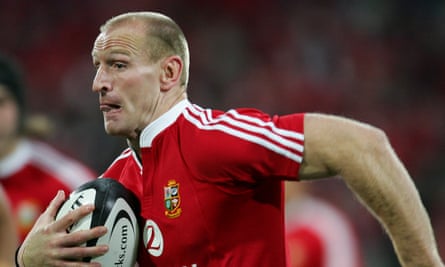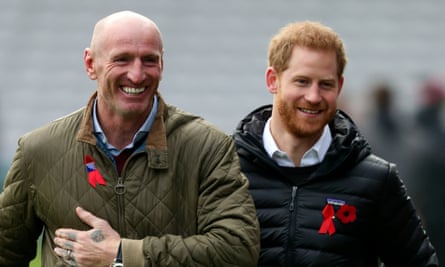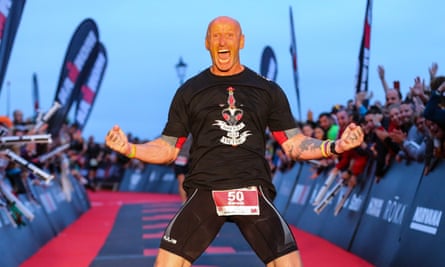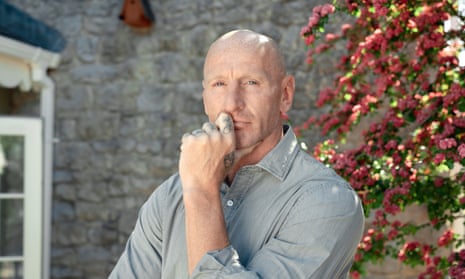The moment Gareth Thomas found out he was HIV positive, all he could imagine was the Aids epidemic. Sensational images of his future took over: frailty, shame, isolation, social exclusion. He remembered Norman Fowler’s tombstone advert and the people with leprosy he learned about at school who were banished to colonies. He thought it was a death sentence.
“It was an overriding feeling that my life was over,” says the former Welsh rugby captain. “It’s like somebody holding a gun to your head and pulling the trigger – how do you explain how that feels?”
It has been almost nine months since Thomas announced he was HIV positive. A BBC documentary, Gareth Thomas: HIV and Me, aired shortly afterwards. He timed the announcement to coincide with his taking part in an Ironman triathlon. It was a carefully orchestrated media campaign to drive home a very simple message: HIV didn’t weaken him. He was in control. His life was not over.
Thomas is probably the most famous person who has talked about living in the UK with HIV. The Terrence Higgins Trust conducted a survey shortly after his announcement and found that 74% of British adults were aware he had HIV, which was helped by Prince Harry’s public show of support.
“What I knew about HIV was everything I shouldn’t have known about HIV,” he says. “It was very historical, very past tense and very unfactual.” Like many people living with HIV today, Thomas takes one pill every day at 6am, which stops the virus from replicating in his body. Modern antiretroviral medication reduces the virus in the bloodstream to such an extent that a person becomes “undetectable” – they are unable to pass on the virus through sex.

The beginning of lockdown got him in a “right old tizz”, he says, speaking via Zoom from his home near Bridgend, Wales, where he lives with his husband, Stephen Williams-Thomas. Hearing the word “virus” on the radio constantly brought him back to darker times – and the fear he felt about finding out he was HIV positive. He cried a lot.
Now he is in a more comfortable rhythm. “In the first week of lockdown, I thought: I’ve got to get super-fit, learn maths, read books and bake banana bread. There was all that pressure that you can’t waste time. Now I just do the stuff I want to do.” This includes walking the dog and spending lots of time with his husband, “which is really nice because it’s not something we are used to”. His work, as a media commentator and campaigner, is at a “bare minimum now”, in contrast to its usual hectic pace – and the house-move just down the road that was supposed to be completed is on hold. “I’m not buying into the pressure of having to fill my time just because I’ve got time.”
Is it hard to be still, as someone who built a career out of competing? “People think competitors are winners, or people who have to concede. I’m competitive because I enjoy competition – not because I feel like I have to achieve something. I really found this – not having any competition for probably the first time ever in this world – quite calming.”
He first got married in 2001, to Jemma Thomas, whom he had known at school. He came out to her in 2006, and she supported him through his public announcement of his sexuality. Their divorce was finalised in 2010 and Thomas married Stephen a few years ago, without fanfare. In fact, he made the marriage public only after revealing his HIV diagnosis, thanking his partner for his support. Carrying such a secret is familiar territory for Thomas – when he came out publicly in 2009 at the age of 35, becoming one of the first professional athletes to do so, he said he had endured “years of despair” keeping his sexuality a secret from his wife, friends, family and colleagues. Even today, he shuts down any questions about his marriages.
Thomas shot on to the professional rugby scene in 1994, aged 20, playing for his home town, Bridgend. He made his international debut just a year later against Japan. It was playing for Wales that cemented his reputation. Career highlights include captaining Wales in 2005 to the first grand slam in 27 years, in 2007, before going on to become the country’s most capped rugby union player (he was overtaken by Stephen Jones in 2011).
To come out in the macho world of rugby was, at the time, extraordinary. To come out as HIV positive in 2019 felt similarly enormous. “It felt much more shameful,” he says. He won’t say when he was first diagnosed, in order to protect his previous partners, but it was some time ago. Unlike his sexuality, he felt he would be blamed for his HIV status and told that he should have been more careful. “This was something that I felt people wouldn’t understand.”

He would be proved right. For evidence that stigma against those with HIV is still very much alive, consider the manner with which Thomas was forced to tell his parents. One day, having stayed with them, his father was driving him to get a train to London. They noticed a man standing in the road. His father pulled over to check if he was OK.
“It was a reporter. He stuck his head in the window and he said to my father: ‘Do you have any comment about your son having HIV?’ I put the window up and I said to my father: ‘Just drive.’”
Thomas reassured his father that it was “just the press looking for a story”. Thomas boarded the train to London and his father went home. The reporter followed his dad.
“He knocked on the door and my mum and my dad answered,” says Thomas. They noticed a recording device in the reporter’s pocket. Again, the reporter asked them to comment on their son’s HIV status. His parents refused and closed the door. “Then I had the phone call from my mother, in tears. I have never felt like I was so far away from home in my entire life.”
When Thomas arrived back in Wales that night, he went to his parents’ house and told them everything. They, too, had very little understanding about the realities of being HIV positive in the UK today. “What this journalist didn’t know is that my parents thought I was gonna die – they didn’t know any different.”
Thomas and his legal team were granted an injunction preventing the newspaper from revealing that he was HIV positive. It was the catalyst for Thomas deciding to go public, however, and he began making the BBC documentary. Before its release, though, his legal team were unable to prevent a story running in the Sun about an unnamed sports star who was about to reveal that he had HIV.
Thomas says the article was “the biggest load of bullshit to do with HIV”. Why does he think there is still an appetite to expose people as HIV positive? “Because people don’t know that much about HIV, it is a really easy subject to sensationalise. There are not that many public figures who are open about it.”
He is still angry about losing his autonomy over the situation. Thomas is incredibly close to his family, especially his parents, and is fiercely protective of them. “It was my right to pick the moment to tell my family about this. It wasn’t somebody else’s right to force that moment upon us. I can never pick that moment again. I never had that opportunity and that really pisses me off.”
Thomas has previously stated that he would not have revealed his status were it not for newspaper threats to publish it. Now he is grateful that it is public. “I actually feel kind of empowered and feel like I live a freer, happier life when I don’t have secrets,” he says. “I’m quite happy to shine a light on the negative moments in life.”

When Thomas came out as gay, he was the first professional rugby union player to do so. Since then, he has counselled other athletes on coming out, including a few footballers.
“There’s a media witch-hunt,” says Thomas about the intense focus on the potential first openly gay Premier League player. “If it’s taking up column inches now, when there isn’t one, imagine what it will take up when the reality comes our way. I don’t think they’re helping to create an environment where the footballer could feel safe and protected.”
Thomas retired in 2011 and since then has appeared on Celebrity Big Brother and Dancing on Ice. At one stage, Mickey Rourke was going to adapt his story for the big screen and play the rugby star himself, after reading about him in Sports Illustrated. Rourke apparently even hired a speech coach to help him master the Welsh accent. The project is still in the works, although it won’t be Rourke playing Thomas, he says.
Now well adjusted to his retirement from professional rugby, Thomas doesn’t miss playing much, although he does miss the camaraderie and the structure it gave him. He will probably be remembered as much for his achievements off the field as those on them – he has used his platform to champion issues close to him: LGBTQ+ equality, mental health and, more recently, raising awareness about HIV. Could his career drift toward something more political?
“My mate said to me: ‘Well, you’re really passionate about Wales, so why don’t you do something that has a relevance to Wales?’” says Thomas. “But the trouble is I am really honest about what I think. And I think that’s where I would let myself down – I find it difficult to not say things.”
Throughout his career, Thomas has been outspoken about his struggles with mental health – particularly in his 2014 autobiography, Proud, in which he wrote about how close he came to suicide. He has spent a long time working on becoming “absolutely OK with who I am”, he says. “I don’t find justification in who I am just by my achievements any more … I know I have faults. I know I’ve massively screwed up. I know in my future I will continue to screw up.”
What was his biggest screw-up? “I’ve lied to so many people,” he says. “I’ve ruined years of people’s lives by my untruths. I’ve ruined years of my life by untruths. I’ve looked people in the eye and I’ve been somebody who I’m really not. People always say to me: ‘You’ve earned the right to move on now.’ But you know what? I don’t want to ever be that person again. So I’m not going to forget about those moments because if I forget about them, then I justify them. So I make sure that I keep all my screw-ups with me.”
Thomas plans to continue doing what he can to raise awareness around HIV and has taken on the role of commissioner on the first HIV Commission, which was set up by the Terrence Higgins Trust and National Aids Trust to create recommendations on how to end HIV transmissions in England.
“I feel really proud of the way I took control of my narrative,” he says. “And I felt it was potentially educating or re-educating a lot of people.”
Is it a topic that should be taught in schools? “Yeah, I personally think so,” he says. “I’m very passionate about children learning about HIV; to be able to protect yourself or to be able to have the knowledge of HIV is a very powerful tool to have. And, I’ll be brutally honest, I personally think it would make my life, and the lives of other people with HIV, a lot easier or a lot less complicated.”
Still, things are a lot less complicated for Thomas now than they were this time last year. He is no longer keeping any secrets from those closest to him and the panic attacks and dark thoughts he was having have eased. “My life is so much better,” he says. “I realised having HIV doesn’t limit me; it actually challenges me to make sure that every moment of my life I live to my full potential. I really, really was convinced I was going to die. I don’t feel like I’ve had this rebirth, but I do feel like I’ve had a rewiring. I’m OK with who I am. So it has changed my life, in an unbelievably positive way.”
In the UK and Irish Republic contact Samaritans on 116 123 or email jo@samaritans.org.
In the US the National Suicide Prevention Lifeline is 1-800-273-8255.
In Australia the crisis support service Lifeline is 13 11 14.
Other international suicide helplines can be found at www.befrienders.org
This article was amended on 9 June 2020. A previous version of this article stated that Thomas had a formal role with the Terrence Higgins Trust. Thomas is commissioner for the HIV Commission, which was was set up by Terrence Higgins Trust and NAT to develop independent recommendations towards ending all new HIV transmissions in England by 2030.
